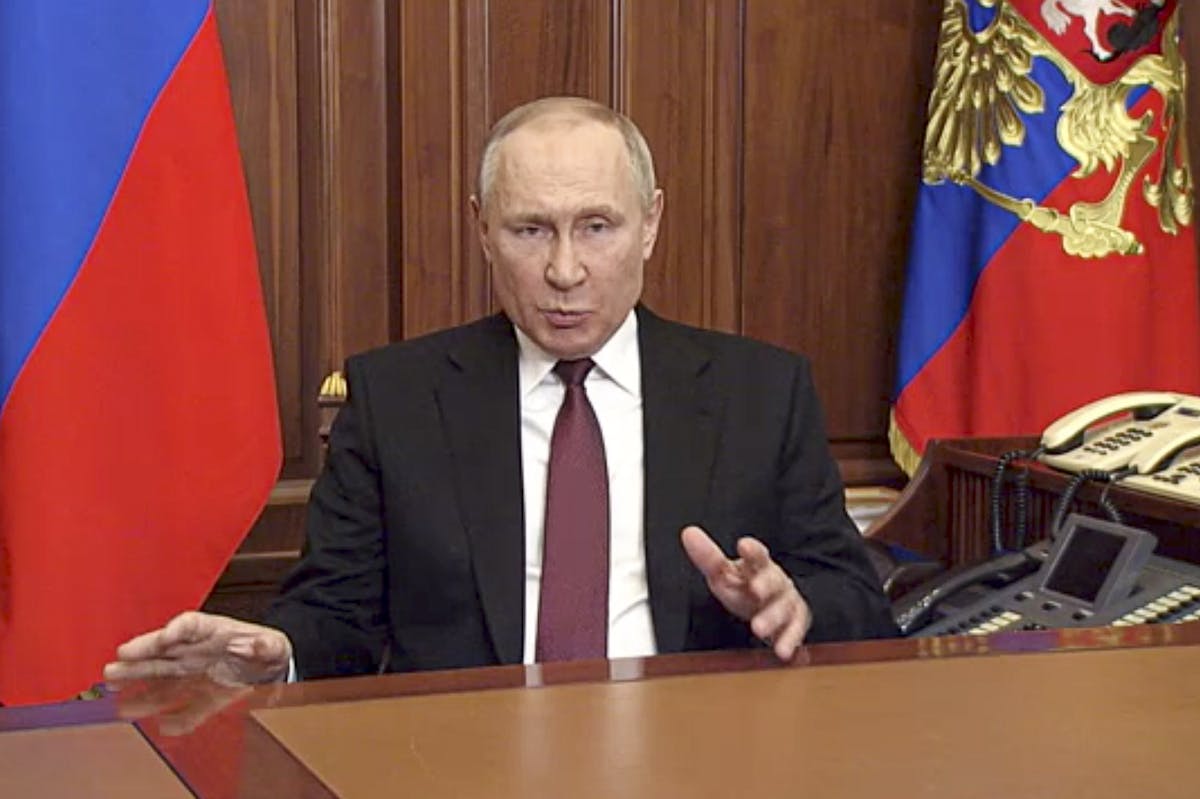Signs Suggest That Ukraine and Russia Are Edging Toward a Compromise
The greatest danger in the present Ukraine crisis is if President Putin substantially succeeds in dismantling an independent Ukraine and subordinating it to Russia.

There are increasing signs that, as was predicted in this space last week, Ukraine and Russia are edging toward a compromise. The most likely arrangement continues to be that the mainly Russian-speaking areas of east Ukraine, which Russia has already declared to be self-governing (a euphemism for governed by the Kremlin), will secede from Ukraine, and Ukraine’s sovereignty will be affirmed as an independent-but-non-aligned state whose borders and national integrity would be guaranteed by both NATO and Russia.
In this scenario, Ukraine would refrain from joining NATO but would receive the double guarantee of its security and would be free to join the European Union and align itself economically and culturally with the West when it met the criteria for EU membership.
Ukraine’s president, Volodymyr Zelensky, has been so overwhelmingly successful as a war leader, it is hard to imagine that he could not succeed in enhancing civic and public administrative standards to the point where the country would be eligible for EU membership. Ukraine would then be in the EU but outside NATO, as are Ireland, Finland, Sweden and Austria.
It is to be prayerfully hoped that Thursday’s meeting between the Ukrainian and Russian foreign ministers, though nothing came of it, indicates such a movement toward reconciliation and explains the otherwise truly horrifying debacle of American leadership on the issue of giving Polish warplanes to the Ukrainians and replacing them with American fighter planes for the Poles.
If the United States’ departments of state and defense do not have some such excuse for the low farce of bobbling back-and-forth on the much-discussed warplane transfers with Ukraine and Poland last week, the Biden administration is breaking down in shambles and is incapable of showing any coherence or discretion in addressing any serious international problems.
Even someone as disconcerted as I have been by the all-encompassing range of the policy failures of the administration finds it difficult, as well as depressing, to imagine that American policy-making has become as incompetent as it appeared this week. The earnest but disarmingly naive secretary of state, Antony Blinken, was flatly contradicted by the equally earnest and bumblingly inarticulate Pentagon spokesman, John Kirby.
Any such compromise as this would satisfy the legitimate ambitions of both parties. It is understandable that Russia would have an interest in ensuring the well-being and political autonomy of parts of eastern Ukraine where ethnic Russians constitute the majority of the population.
Russia having governed Ukraine for 200 years prior to 1991, this is not on its face an unreasonable aspiration for Russia, which despite the failure of communism and the disintegration of the Soviet Union, has not ceased to be one of the world’s great nations.
The desire of Ukraine to be independent is also reasonable and is the right of any adequately numerous and determined people and one that in recent memory has been exercised by the Czechs and Slovakians, as well as the Serbians, Croatians, Slovenians and other ethnic components of the former Yugoslavia.
It is also comprehensible that the Russians would have some reservations about Ukraine joining NATO, even though it is a defensive alliance and must retain the right to determine for itself what countries it will accept as members. To Russia, NATO was the chief instrument of the containment of the U.S.S.R. during the Cold War.
Such a settlement as this would largely resolve the great uncertainty that has existed in central Europe since the dissolution of the Soviet Union over Moscow’s refusal to accept the durable independence of its former republics.
In all of the circumstances, and despite Russia’s romantic attachment to Tashkent and Samarkand, it is doubtful that it wishes the restoration to Russian citizenship of the mainly Muslim Asian republics of Kazakhstan, Kyrgyzstan, Tajikistan, Turkmenistan and Uzbekistan, though Russia can certainly retain influence in those places.
The Baltic and Armenian republics — Latvia, Lithuania, Estonia, Armenia, Azerbaijan and Georgia — are probably now beyond reach; Belarus is in hand, and the retrieval of the Russian-speaking provinces of Ukraine would restore almost 15 percent of that state to Russia, which would increase Russia’s population and its perceived strength.
Such an outcome as this would also lead quite quickly to Russian disillusionment with the status of being a junior partner of China, a country that is notoriously overbearing and either subordinates or constantly skirmishes with neighbors whom it judges insufficiently deferential.
After the relaxation of its artificial dalliance with Beijing, Russia could revert to its traditional struggle between the nativist and western emulative factions of its society. The West would then be free to pursue constructively a gradually closer relationship with Russia, with whom the West would no longer have any serious disagreements.
Numerous Russian leaders, including Mikhail Gorbachev, Boris Yeltsin and Vladimir Putin, have expressed interest in joining NATO since the dissolution of the Soviet Union. If Russian democracy became somewhat more plausible than it is now, that would be a feasible and attractive proposition for all parties.
This is an area covered in broken promises: the erstwhile state secretary, James Baker, promised Mr. Gorbachev that with the reunification of Germany, NATO would “not advance an inch to the east;” President George H.W. Bush made the infamous “Chicken Kiev” speech in 1991 urging Ukraine to remain within Russia.
And Russia, China, America, Britain, and France all promised to protect the security of an independent Ukraine when it voluntarily surrendered its nuclear weapons in 1994. President George W. Bush wanted Ukraine and Georgia in NATO, but several of the European countries demurred. Nobody’s word has been worth anything, and we are starting from scratch.
The western world would then consist of most of the great Eurasian landmass and most of the Americas and Australasia and it would be set to maintain its long preeminence in the world for centuries to come.
The greatest danger in the present Ukraine crisis is if Mr. Putin substantially succeeds in dismantling an independent Ukraine and subordinating it to Russia, as that would be another heavy blow to the West, following the Afghan disaster, the impending surrender to a nuclear-armed Iran, and the profound enfeeblement of an America racked by violence, illegal immigration, the loss of economic ground to China, climate hysteria that has driven up energy costs, and a failure in leadership in the armed forces that has compromised American military superiority and distracted personnel with woke nonsense. In such circumstances, a Sino-Russian alliance could be durable and dangerous.
If the shilly-shallying over the Polish warplanes is not related to incipient progress towards a reasonable solution to the Ukraine crisis and instead represents American statesmanship in the era of President Biden’s insidious reign of incompetence, then Ukraine is in for a long and brutal struggle and the West will have to strive desperately to maintain parity with the Sino-Russian bloc (to which there would soon be many adherents).
American voters and the electoral system will have to do a great deal better than they have in the last few years to avoid a precipitate plunge in the strength and prestige of the United States, which would take practically all of the West with it.
The American isolationists and Russophiles, presumably unknowingly, are trying to lead America to a premature surrender of its status as the world’s leading power. The news in Ukraine is somewhat better this week, but the stakes could still scarcely be greater.
CMBLetters@gmail.com. From the National Post.

